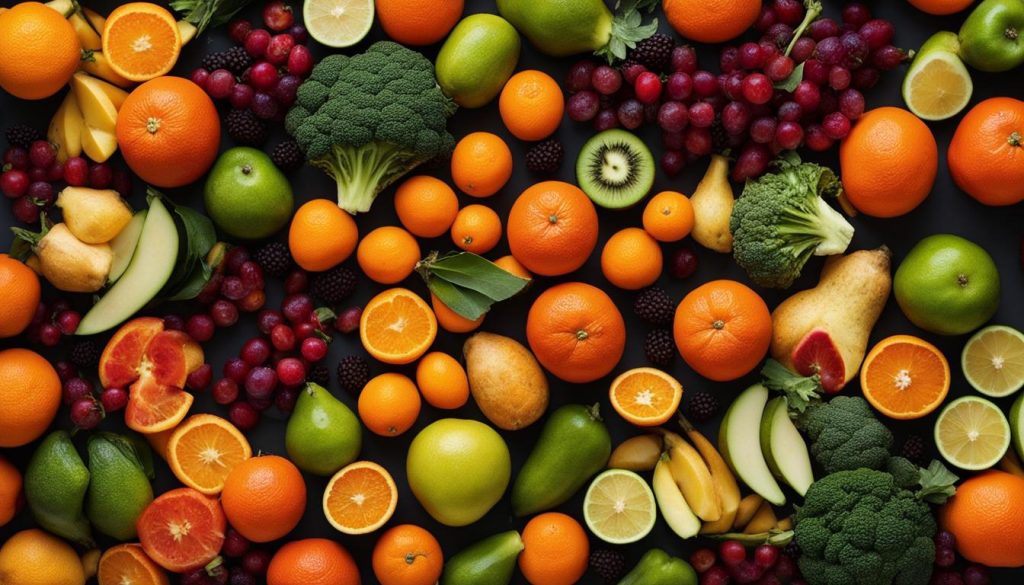Dogs have specific dietary needs and sensitivities when it comes to fruits. While some fruits can provide dogs with essential vitamins and minerals, not all fruits are safe for canine consumption. In this article, I will explore whether dogs can safely eat mandarins and discuss the potential benefits and risks associated with feeding them to dogs. I will also provide guidelines on how to safely incorporate mandarins into your dog’s diet and discuss alternative fruits that are safe and beneficial for dogs.
Understanding Dogs’ Dietary Needs and Fruit Consumption
Dogs have distinct dietary requirements that differ from those of humans. While their primary source of nutrition should come from high-quality dog food, incorporating certain fruits into their diet can offer additional health benefits. However, not all fruits are safe for dogs to consume. Dogs are primarily carnivores, but they can also consume small amounts of fruits and vegetables. Before introducing mandarins or any other fruit to your dog, it’s essential to consult with your veterinarian to ensure their specific dietary needs are met.
When it comes to dogs’ dietary needs, it’s important to consider their natural instincts and digestive capabilities. Dogs have shorter digestive tracts than humans, which means they are better equipped to digest and absorb nutrients from animal-based proteins. However, they can also derive certain benefits from incorporating plant-based foods into their diet. Fruits and vegetables can provide dogs with additional vitamins, minerals, and dietary fiber.
When it comes to fruit consumption, it’s essential to choose fruits that are safe for dogs and offer nutritional value. Some fruits that are generally safe for dogs to consume include apples, blueberries, cantaloupe, and strawberries. These fruits are low in calories and high in vitamins and antioxidants. However, it’s important to introduce new fruits gradually and in small portions to monitor your dog’s tolerance and potential allergic reactions.
Nutritional Needs of Dogs
Dogs have specific nutritional requirements that must be met for their overall health and well-being. These include:
- Protein: Dogs require high-quality protein sources to support muscle development and energy levels. Animal-based proteins, such as lean meats, poultry, and fish, are the most bioavailable and should make up the majority of a dog’s diet.
- Fat: Dogs need essential fatty acids for hormone production, skin and coat health, and energy. Healthy sources of fat include fish oil, flaxseed oil, and chicken fat.
- Carbohydrates: While dogs do not have a strict requirement for carbohydrates, they can benefit from digestible sources such as whole grains, legumes, and vegetables for additional fiber and energy.
- Vitamins and Minerals: Dogs require a balanced mix of vitamins and minerals to support various bodily functions. These can be obtained through a combination of high-quality dog food and suitable fruits and vegetables.
Please be aware that individual dogs may have specific dietary needs or health conditions that require customized nutrition plans. Consulting with a veterinarian is crucial to ensure dogs receive the appropriate diet for their specific needs and to determine if fruits, such as mandarins, are suitable for their individual dietary requirements.
Nutritional Content of Mandarins
Mandarins are not only delicious but also packed with important nutrients that can benefit your dog’s health. Let’s take a closer look at the nutritional content of mandarins and the vitamins they contain.
One medium-sized mandarin contains approximately:
- Calories: 47
- Total Fat: 0.3 grams
- Sodium: 1 milligram
- Potassium: 200 milligrams
- Total Carbohydrates: 12 grams
- Dietary Fiber: 1.6 grams
- Sugar: 9 grams
- Protein: 0.7 grams
Mandarins are also rich in vitamins, particularly vitamin C. One medium-sized mandarin provides approximately 24 milligrams of vitamin C, which is about 40% of the recommended daily intake for dogs.
“Mandarins are a good source of vitamins, including vitamin C, which plays a crucial role in supporting the immune system.”
Health Benefits of Mandarins for Dogs
The vitamin content in mandarins can provide several health benefits to dogs. Vitamin C, for example, is an antioxidant that helps support the immune system, promote collagen production, and aid in wound healing. It also has anti-inflammatory properties that may be beneficial for dogs with arthritis or other inflammatory conditions.
In addition to vitamin C, mandarins also contain dietary fiber, which can support digestive health by promoting regular bowel movements and preventing constipation. The potassium content in mandarins can help regulate blood pressure and promote proper muscle and nerve function.
Please be aware that while mandarins can offer these health benefits, they should be served in moderation and as part of a balanced diet. Always consult with your veterinarian before introducing mandarins or any other new food to your dog’s diet.
| Nutrient | Amount per Medium-Sized Mandarin |
|---|---|
| Calories | 47 |
| Total Fat | 0.3g |
| Sodium | 1mg |
| Potassium | 200mg |
| Total Carbohydrates | 12g |
| Dietary Fiber | 1.6g |
| Sugar | 9g |
| Protein | 0.7g |

Can Dogs Eat Mandarins: The Pros and Cons
Feeding mandarins to dogs can have both potential benefits and risks. Let’s take a closer look at the pros and cons of including mandarins in your dog’s diet.
The Benefits of Feeding Mandarins to Dogs
Mandarins are rich in essential vitamins and minerals, including vitamin C, which plays a crucial role in supporting the immune system. By incorporating mandarins into your dog’s diet, you can provide them with an additional source of these essential nutrients. Furthermore, the dietary fiber present in mandarins can aid in promoting digestive health in dogs. It can help regulate their bowel movements and improve overall gut function.
Additionally, mandarins contain antioxidants, which help protect cells from damage caused by free radicals. This can contribute to your dog’s overall health and well-being. With these potential benefits, mandarins can be a nutritious addition to your dog’s diet, but it’s important to keep the following risks in mind.
The Risks of Dogs Eating Mandarins
While mandarins can provide certain health benefits, there are risks involved in feeding them to dogs. One of the primary concerns is the potential for allergic reactions. Some dogs may be allergic to citrus fruits, including mandarins. Allergic reactions can manifest as itching, skin rashes, gastrointestinal upset, or respiratory distress in dogs. If you notice any of these symptoms after feeding your dog mandarins, it’s crucial to seek veterinary advice.
Another risk to consider is the possible digestive upset that mandarins can cause. The high fiber content in mandarins can lead to diarrhea or upset stomach in some dogs, especially if they consume large quantities or if their digestive systems are sensitive. It’s essential to introduce mandarins gradually and monitor your dog’s response to ensure they can tolerate this fruit.
Mandarin Orange Toxicity in Dogs
While mandarins are generally safe for dogs to eat, caution must be exercised regarding the peel and seeds. The peel can be difficult for dogs to digest and may cause gastrointestinal issues. The seeds, if ingested in large amounts, can pose a choking hazard or even blockages in the digestive tract. Always remove the peel and seeds before serving mandarins to your dog.
In addition to the risks mentioned above, some dogs may have specific medical conditions or sensitivities that can make mandarins unsuitable for them. If your dog has any underlying health issues or is on a special diet, consult with your veterinarian before adding mandarins or any new food to their diet.
Overall, while mandarins can offer potential benefits to dogs, it’s crucial to make informed decisions and closely monitor your dog’s response. If you decide to introduce mandarins as a treat or supplement to your dog’s diet, do so in moderation and consult with your veterinarian for personalized dietary recommendations.
How to Safely Feed Mandarins to Your Dog
When it comes to feeding mandarins to your dog, there are some important precautions to keep in mind. While mandarins can provide certain nutritional benefits, it’s crucial to ensure the safety and well-being of your furry friend.
To safely feed mandarins to your dog, it’s recommended to follow these guidelines:
- Remove the peel and seeds: The peel and seeds of mandarins can be choking hazards and may cause digestive issues in dogs. It’s essential to remove them before offering mandarins to your dog.
- Small portions as treats: Serving mandarins in small portions as a treat or supplement to your dog’s regular diet is ideal. Remember that mandarins should not be a primary food source for your dog.
- Observe your dog’s reaction: Every dog is unique, and some may have sensitivities or allergies to certain foods, including mandarins. Monitor your dog’s reaction after consuming mandarins and adjust the serving size accordingly.
By taking these precautions, you can ensure the safe enjoyment of mandarins by your furry companion.
Table: Serving Size Guide for Dogs
| Dog Size | Serving Size |
|---|---|
| Small (up to 20 lbs) | 1-2 small mandarin segments |
| Medium (20-50 lbs) | 2-3 small mandarin segments |
| Large (50+ lbs) | 3-4 small mandarin segments |
Remember, serving sizes may vary depending on your dog’s individual needs and overall health. Always consult with your veterinarian for personalized advice on feeding mandarins or any other foods to your dog.

Alternative Fruits for Dogs
If you’re looking for alternative fruits to feed your dog, there are several options that are safe and beneficial. While mandarins are one citrus fruit that dogs can eat, tangerines, which are part of the same citrus family, may not be well-tolerated by all dogs due to their higher acidity. It’s important to introduce new fruits gradually and monitor your dog for any adverse reactions.
Here are some safe fruits for dogs:
- Apples: Apples are a great source of vitamins A and C, as well as dietary fiber. Make sure to remove the seeds and core before offering them to your dog.
- Blueberries: Blueberries are packed with antioxidants and can provide a healthy boost to your dog’s immune system. They are also low in calories and high in fiber.
- Cantaloupe: Cantaloupe is a refreshing fruit that is safe for dogs to eat. It is rich in vitamins A and C, as well as beta-carotene.
- Strawberries: Strawberries are another safe fruit for dogs. They are a good source of vitamins C and K and are also low in calories.
When introducing new fruits to your dog, it’s important to start with small portions and observe their reaction. If your dog shows any signs of allergies or digestive upset, consult with your veterinarian. Remember, fruits should be offered as occasional treats or supplements to a balanced diet formulated specifically for dogs.
| Fruit | Vitamins | Benefits |
|---|---|---|
| Apples | Vitamins A and C | Boosts immune system, provides dietary fiber |
| Blueberries | Antioxidants | Supports immune system, low in calories and high in fiber |
| Cantaloupe | Vitamins A and C, beta-carotene | Refreshing, provides essential nutrients |
| Strawberries | Vitamins C and K | Low in calories, contributes to overall health |
Allergic Reactions in Dogs: Recognizing the Symptoms
Allergies can affect dogs just like they do humans, and it’s essential for pet owners to be able to recognize the signs of allergic reactions in their furry companions. If you suspect that your dog may be having an allergic reaction, it’s important to seek veterinary advice as soon as possible. Here are some common symptoms of allergies in dogs to watch out for:
- Itching and scratching excessively
- Skin redness or inflammation
- Hot spots or rashes
- Hives or welts
- Swelling, particularly around the face, ears, or paws
- Sneezing or coughing
- Runny nose or eyes
- Gastrointestinal upset, such as vomiting or diarrhea
- Difficulty breathing or wheezing
If you notice any of these symptoms after feeding your dog mandarins or any other new food, it’s crucial to consult with your veterinarian. They can help determine whether your dog is experiencing an allergic reaction and provide appropriate treatment or dietary recommendations.
Table: Common Allergens for Dogs
| Allergen | Symptoms |
|---|---|
| Fleas and ticks | Intense itching, hair loss, skin infections |
| Pollen | Sneezing, coughing, watery eyes |
| Mold spores | Itchy skin, respiratory distress |
| Dust mites | Itching, sneezing, coughing |
Please be aware that allergies can develop over time, even if your dog has been exposed to certain foods or substances without any previous issues. By being aware of the common symptoms and working closely with your veterinarian, you can help manage your dog’s allergies and provide them with the best possible care.

Tips for a Healthy and Balanced Diet for Dogs
When it comes to ensuring your dog’s overall health and well-being, a balanced diet is of utmost importance. While incorporating fruits into their diet can provide certain benefits, it is crucial to remember that they should never replace a high-quality dog food that meets all their nutritional needs.
Here are some tips to help you maintain a healthy and balanced diet for your furry friend:
- Consult with your veterinarian: Every dog is unique and may have different dietary requirements based on their age, breed, size, and any underlying health conditions. It’s essential to consult with your veterinarian to get personalized nutrition advice for your dog.
- Stick to high-quality dog food: High-quality dog food is specifically formulated to provide all the essential nutrients that dogs need. Look for options that list meat as the primary ingredient and avoid foods with artificial additives or fillers.
- Introduce fruits as occasional treats: While fruits can be a healthy addition to your dog’s diet, they should be offered in moderation as occasional treats or supplements. Serve them in small portions and monitor your dog’s response to ensure they can tolerate the fruit.
- Consider alternative safe fruits: If you’re looking to diversify your dog’s fruit options, there are several safe alternatives to mandarins. Apples, blueberries, cantaloupe, and strawberries are all fruits that dogs can safely enjoy. Always introduce new fruits gradually and watch out for any adverse reactions.
“A balanced diet is essential for dogs to thrive and maintain optimal health. It’s crucial to provide them with high-quality dog food and incorporate fruits as occasional treats or supplements.”
Remember, maintaining a healthy and balanced diet for your dog is key to their overall well-being. Always prioritize their specific nutritional needs and consult with a veterinarian for personalized dietary recommendations.

| Key Points | Details |
|---|---|
| Consult with your veterinarian | Seek personalized nutrition advice for your dog’s specific needs. |
| Stick to high-quality dog food | Choose dog food with meat as the primary ingredient and avoid artificial additives or fillers. |
| Introduce fruits as occasional treats | Serve fruits in small portions and monitor your dog’s response. |
| Consider alternative safe fruits | Apples, blueberries, cantaloupe, and strawberries are safe fruit options for dogs. |
Wrapping Up
To summarize, dogs can safely eat mandarins as part of a balanced diet. However, it is important to introduce them gradually and take necessary precautions. When feeding mandarins to your dog, always remove the peel and seeds to prevent choking hazards and digestive issues. Serve mandarins in small portions as treats or supplements, rather than as a primary food source. It is crucial to monitor your dog for any adverse reactions and consult with your veterinarian for personalized dietary recommendations.
While mandarins can provide some nutritional benefits, they should not replace a balanced diet formulated specifically for dogs. High-quality dog food is the primary source of nutrition and should meet all their dietary needs. Fruits like mandarins should be offered in moderation. Alternative fruits such as apples, blueberries, cantaloupe, and strawberries are also safe and beneficial for dogs to consume. By following these guidelines and consulting with your veterinarian, you can ensure your dog’s health and well-being.
When it comes to canine nutrition, it is essential to make informed decisions and prioritize your dog’s specific dietary needs. While mandarins and other fruits can be enjoyed by dogs, it is important to consider their overall diet and consult with professionals. By providing a balanced diet and incorporating safe fruits, you can enhance your dog’s nutrition and contribute to their overall health and happiness.
FAQ
Can dogs eat mandarins?
Yes, dogs can safely eat mandarins, but precautions should be taken.
Are mandarins safe for dogs to consume?
Mandarins can be safe for dogs in moderation, but it’s important to remove the peel and seeds.
What are the benefits of feeding mandarins to dogs?
Feeding mandarins to dogs can provide essential vitamins and minerals, boost the immune system, and promote digestive health.
What are the risks of dogs eating mandarins?
Risks include potential allergic reactions, digestive upset, and the risk of mandarin orange toxicity in dogs.
How should I feed mandarins to my dog?
When feeding mandarins to your dog, remove the peel and seeds, serve them in small portions as a treat or supplement, and monitor your dog’s response.
Are there alternative fruits for dogs?
Yes, dogs can safely enjoy fruits such as apples, blueberries, cantaloupe, and strawberries.
What are the signs of allergic reactions in dogs?
Signs of allergic reactions in dogs may include itching, skin rashes, gastrointestinal upset, or respiratory distress.
How can I ensure a healthy and balanced diet for my dog?
A healthy and balanced diet for dogs should primarily consist of high-quality dog food formulated to meet their nutritional needs, with fruits offered as occasional treats or supplements.
What should I remember about feeding mandarins to my dog?
While dogs can safely eat mandarins, they should be served in moderation, and any new food should be introduced gradually. Always consult with your veterinarian for personalized dietary recommendations.






